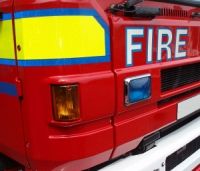

Life-saving firefighter cancer monitoring is to be launched as part of a UK-wide research project commissioned by the Fire Brigades Union (FBU).
The testing is being carried out this week in Greater Manchester by the University of Central Lancashire (UCLan), led by Professor Anna Stec.
100 firefighters will provide blood and urine samples, which will be analysed for the number of biomarkers of cancers and other diseases, and toxic chemicals.
Dave Russell, chief fire officer for the region, said it was a "significant step forward for firefighter safety".
The results will be used to detect cancers and other diseases at the early stages and to identify evidence linking occupational cancers with exposure to toxic fire chemicals. Greater Manchester Fire and Rescue Service is working with the FBU and UCLan to facilitate the testing.
Research has found that instances of cancer among UK firefighters aged 35-39 is up to 323% higher than in the general population in the same age category.
It also found firefighters were significantly more likely to die from rare cancers, heart attacks and stroke, and several other diseases.
Riccardo la Torre, FBU national officer said: "We launched the first firefighter health monitoring project of its kind in the UK in February and are proud to now be testing even more firefighters".
"The government and fire service employers have ignored firefighters and their exposures to toxic contaminants for far too long".
He said lack of health monitoring meant cancers were being caught "tragically late, at much more untreatable stages" and firefighters were "dying far too often and far too early".
"We won't stop until every firefighter in the UK has access to regular health monitoring".
Prof Stec from UCLan said it was "widely accepted that firefighters are dying from rare cancers up to 15-20 years earlier than the general public".
"It is therefore vital that measures such as health monitoring is introduced so firefighters can be properly protected".
Dave Pike, FBU Greater Manchester brigade secretary, said the project was "part of our fight for protections from cancers, in the memory of every firefighter we have already lost".
"Every service across the UK must follow this positive example".